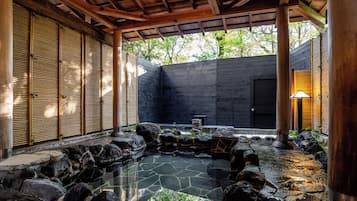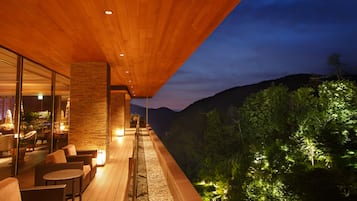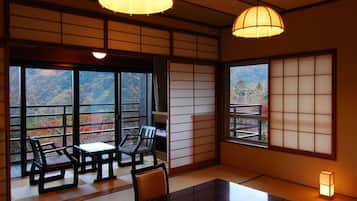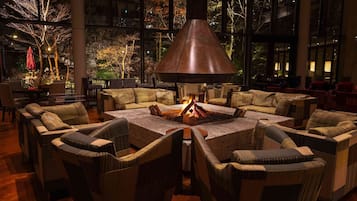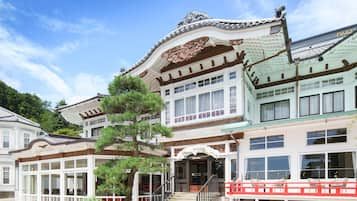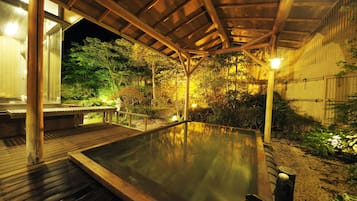Hakone is a major tourist destination that's surprisingly easy to get to from Tokyo. Most people think of Hakone as a hot spring area, but Mt. Hakone is actually a large volcano set in a rich natural environment of magnificent volcanic terrain.
At the top of the mountain is Lake Ashi, a beautiful caldera lake, and in Owakudani you a wild active volcano that's still active today. There are plenty of mountain climbing and hiking courses around the outer rim of the volcano and caldera. And because it's located just south-east of Mt. Fuji, Japan's most sacred mountain, Hakone is one of the best places for beautiful views of Fuji-san. This is a tourist destination that can be enjoyed by people of all ages, and it's convenient too, with trains, buses, and ropeways to help you get around.
- 1
Fuji Hakone Izu National Park
A national park providing beautiful views of Mt. Fuji from every angle

- Avventure
- Coppie
- Famiglie
- Storia
- Foto
Stretching over 4 prefectures (Kanagawa, Shizuoka, Tokyo, and Yamanashi), the vast Fuji Hakone Izu National Park is divided into 4 areas: the Mount Fuji area, centred on Mount Fuji; the Hakone area, famous for its hot springs and post towns; the Izu Peninsula area, with its beautiful sea views; and the Izu Islands, a group of islands off the coast.
In the Hakone area, you'll find the magnificent nature of the Hakone volcano, as well as the history and culture of the area as an important transport link between the east and west of Japan since ancient times. Each of the numerous hot-spring resorts created by the Hakone volcano have their own unique character, so there's always something new to discover.
Posizione: Motohakone, Hakone, Ashigarashimo District, Kanagawa Prefecture 250-0522, Japan
Orario di apertura: All day
Telefono: Ministry of the Environment Kanto Regional Environment Office: +81 (0)48-600-0516
Mappa - 2
Lake Ashi
A beautiful caldera lake at the top of the Hakone volcano

- Avventure
- Budget
- Coppie
- Famiglie
- Storia
- Foto
Lake Ashi is a crater lake with a maximum depth of 43.5 metres at the top of the Hakone volcano. You can take a sightseeing boat here to view Mount Fuji and the mountains of Hakone.
This mysteriously beautiful lake is also home to the legend of the Kuzuryu (a rampaging dragon with 9 heads) and along the lakeside you’ll find the historic Hakone Shrine and Kuzuryu Shrine, which is related to the dragon. At the southern end of the lake, along the old Tokaido road, beautiful cedar trees are lined up along Hakone-juku (the tenth of the 53 stations of the Tokaido), and the famous Hakone barrier has been reconstructed here. With many hotels and ryokan (Japanese-style inns) with hot springs in the surrounding area, this is a well-known tourist destination that’s easily accessible from the metropolitan area.
Posizione: Motohakone, Hakone, Ashigarashimo District, Kanagawa Prefecture 250-0522, Japan
Orario di apertura: All day
Telefono: Hakone Tourist Information Centre: +81 (0)460-85-5700
Mappa - 3
Goryu Waterfall
A beautiful 5-part waterfall that flows down the lava cliff out of Mt. Fuji

- Budget
- Coppie
- Famiglie
- Foto
Goryu Waterfall is located near the confluence of Kise River and Sano River, which flows between Mount Hakone and Mount Ashitaka. It's about 100 metres wide and 12 metres high and is designated as a Natural Monument in Shizuoka.
It's a 5-section waterfall flowing down a lava cliff. On the left, the 3-section waterfall over the main stream of Kise River is called Odaki, and the 2-section waterfall over the tributary on the right is called Medaki. From the left, the streams have the elegant names Yukidoke, Fujimi, Tsukimi, Choshi and Sagoromo. This is the end of a lava flow from volcanic eruptions about 10,000 years ago, and you can see the layers of lava overlapping each other.
Posizione: Inside Susonoshi Central Park, 7-1 Senpuku, Susono City, Shizuoka Prefecture 410-1116, Japan
Orario di apertura: April—September: 8.30 am to 5 pm, October—March: 8.30 am to 4 pm
Telefono: +81 (0)55-992-5005
Mappa - 4
Myojingadake
A corner of Mt. Hakone's outer rim where you can see Mt. Fuji and Lake Ashi from the summit

- Avventure
- Budget
- Coppie
- Famiglie
- Foto
The summit of Mount Hakone is a caldera and one of its outer rim mountains is the 1,169-metre-high Myojingadake. You can even take a day-trip up the mountain from the famous hot spring resort Gora, which attracts many climbers.
The highlight of this mountain is the excellent view from the summit. On the east you can see Japan's highest mountain, Mount Fuji, with Lake Ashi to the south-west alongside Owakudani, which emits volcanic smoke. You can enjoy climbing the mountain throughout the year, but it’s at its best in April and May, when the wild cherry blossoms and wild azalea bloom beautifully at its foothills. During the snowy season, make sure you have crampons and warm clothing.
Posizione: Miyagino, Hakone, Ashigarashimo District, Kanagawa Prefecture 250-0401, Japan
Orario di apertura: All day
Mappa - 5
Owakudani
Experience the active volcano of Hakone

- Avventure
- Coppie
- Famiglie
- Foto
From Owakudani, you can see the active volcano that is Hakone, which continues to erupt even today. The valley is tinted light yellow by the elements contained in the fumaroles, producing a really wild scene of nature.
Owakudani is located to the north at 800 to 1,000 metres above sea level on Kanmurigadake, the central crater of the Hakone volcano, and you can view the scenery from the air by taking the Hakone Ropeway. A delicacy here is black eggs boiled in hot spring water. The shells are blackened by the hot spring water, and it's said that eating one of these eggs will extend your life by 7 years!
Posizione: 1251-1 Sengokuhara, Hakone, Ashigarashimo District, Kanagawa Prefecture 250-0631, Japan
Orario di apertura: Daily from 9 am to 4 pm
Telefono: Owakudani Information Centre: +81 (0)460-84-5201
Mappa - 6
Chisuji Falls
A beautifully delicate waterfall that runs down the rock surface like threads

- Avventure
- Budget
- Coppie
- Famiglie
- Foto
Chisuji Falls is located in Kowakudani, Hakone, on the upper reaches of the Jakotsu River. It's a small waterfall, 3 metres high but 25 metres wide, and was named Chisuji (meaning “a thousand threads”) because the water streams down the mossy rock surface just like a thousand threads.
This narrow and delicate waterfall has a different appearance from larger ones, and its beauty is soothing and relaxing. The area is covered in deep forest, and you can even see genji fireflies around July. Thanks to the many maple trees in the area, it's also a popular site thanks to its bright green leaves in summer and golds and reds in autumn. You can spend a relaxing time here in pure tranquillity.
Posizione: 507 Kowakudani, Hakone, Ashigarashimo District, Kanagawa Prefecture 250-0406, Japan
Orario di apertura: All day
Telefono: Hakone Tourist Information Centre: +81 (0)460-85-5700
Mappa - 7
Mount Fuji
The symbol of Japan since ancient times

- Avventure
- Budget
- Coppie
- Famiglie
- Foto
At 3,776 metres above sea level, Mount Fuji is the highest mountain in Japan. Fuji is a beautiful cone-shaped volcano, and its graceful shape is widely known outside Japan as a symbol of the country. Since ancient times, it's been regarded as a sacred mountain, and the Asama Goddess is believed to reside on its summit.
It's on the north-west side of Hakone and its beautiful scenery can be seen from all points of Hakone. You can see Mount Fuji from Motohakone across Lake Ashi, from the air by riding the Hakone Ropeway, and from the Otome Pass on the north side. Driving along the Hakone Skyline and Ashinoko Skyline is another great option.
Posizione: Kitayama, Fujinomiya City, Shizuoka Prefecture 418-0112, Japan
Orario di apertura: All day
Telefono: Mt. Fuji General Information: +81 (0)544-21-3220
Mappa - 8
Sengokuhara Susuki Prairie
A fantastic landscape covered with Japanese pampas grass as far as the eye can see

- Avventure
- Budget
- Coppie
- Famiglie
- Foto
Susuki Prairie in Sengokuhara is located in the northern part of the caldera of Mount Hakone. The area is famous for its beautiful autumn landscape of waving golden ears of silver grass.
The best time to visit is from late September to early November. At the beginning of the season, the ears of the grasses shine with silver tones, and as autumn goes on, they gradually turn to a pale golden colour. There’s a well-maintained boardwalk surrounded on both sides by silver grasses, which makes this a very popular spot to take photos of the scenery. In March, the mountains are deliberately burned to prevent excessive growth of bushes in the field, and in summer you’ll find fresh green grasses waving in the breeze, transforming the landscapes into something completely different from autumn.
Posizione: Sengokuhara, Hakone, Ashigarashimo District, Kanagawa Prefecture 250-0631, Japan
Orario di apertura: All day
Telefono: Hakone Town Hall Tourism Division: +81 (0)460-85-7410
Mappa - 9
Mt. Mikuni
A corner of Hakone's outer rim where you can enjoy a spectacular view of Mt. Fuji and Lake Ashi

- Avventure
- Budget
- Coppie
- Famiglie
- Foto
Located on the outer rim of Mount Hakone, Mount Mikuni rises 1,101 metres above sea level. The mountain was named Mikuni (meaning “3 countries”) because it formerly bordered the 3 provinces of Suruga, Sagami, and Izu. It's now at the border between Shizuoka and Kanagawa.
From the summit, which you can reach in about 1 hour from the car park at the Yambushi Pass on the Ashinoko Skyline, you can enjoy a spectacular view of Hakone, Lake Ashi and Mount Fuji. The best times to hike here are during the fresh greens of summer and the golden colours of autumn. Although this course is suitable for beginners and families, you should still make sure you’re well prepared in terms of having good footwear.
Posizione: Motohakone, Hakone, Ashigarashimo District, Kanagawa Prefecture 250-0522, Japan
Orario di apertura: All day
Mappa - 10
Mt. Ashigara
Take a mountain walk for views of Mt. Fuji and Lake Ashi while exploring the legend of Kintaro

- Avventure
- Budget
- Coppie
- Famiglie
- Foto
Mount Ashigara is famous for the legend of a hero named Kintaro. Although this mountain is famous for its role in Japanese poetry, there isn’t a single peak called "Mount Ashigara" today. It’s said that the name actually refers to the mountain range centred on the Ashigaratoge Pass or to Mount Kintoki, the highest peak on the outer rim of Mount Hakone at 1,213 metres above sea level.
You can take a walk of less than 4 hours to the summit of Mount Kintoki, passing the remains of Kintaro's house, his special power water and the Kintoki Shrine, where Sakata No Kintoki (who was the model for Kintaro) was enshrined as a deity. You can enjoy spectacular views of Mount Fuji and Lake Ashi from the summit.
Posizione: Mt. Ashigara: Kuwagi, Oyama, Sunto District, Shizuoka Prefecture 410-1313, JapanDi
Orario di apertura: All day
Mappa




